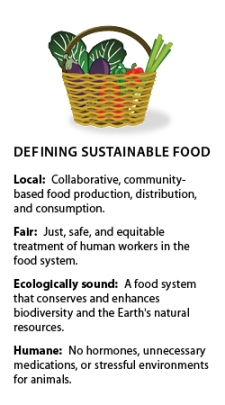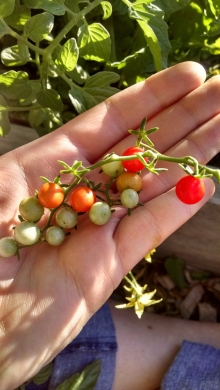
Real Food Challenge is a national organization that works with university students to create healthy, sustainable, and just food systems on their campuses. The overarching goal of of the program is to shift $1 billion of existing university food budgets away from industrial farms and junk food and towards local/community-based, fair, ecologically sound, and humane food sources – or “real food” – by 2020.
By Erin Olschewski, Real Food Challenge at the U of U
One of the first things that caught my attention when I first started at the University of Utah was the lack of healthy, vegetarian-friendly food—both in the dining hall and on main campus. I was constantly trying to find things I could eat that weren’t packaged, greasy, or carb-filled. As a vegetarian of 22 years, I have often struggled to find good, healthy food and eventually these frustrations led to growing passion about food access, health, equity, and sustainability. My negative experiences with food on campus played a major role in my increasing involvement with food and its many dimensions, including courses, service trips, and research projects regarding food justice, holistic nutrition, and sustainable agriculture.
 But change is coming, thanks to the efforts of administrators, faculty, staff, and students at the U. President Pershing will sign the Real Food Campus Commitment today at the Sustainability Showcase from 11 am to 1 pm in the Sustainability Office, suite 50 in the Business Classroom Building. This means that University Dining Services is committing to spending at least 20 percent of their total food purchasing cost on real food—food that is local, nutritional, ecologically sound, humane, and/or fair—by 2020, nearly doubling our current level.
But change is coming, thanks to the efforts of administrators, faculty, staff, and students at the U. President Pershing will sign the Real Food Campus Commitment today at the Sustainability Showcase from 11 am to 1 pm in the Sustainability Office, suite 50 in the Business Classroom Building. This means that University Dining Services is committing to spending at least 20 percent of their total food purchasing cost on real food—food that is local, nutritional, ecologically sound, humane, and/or fair—by 2020, nearly doubling our current level.
During my time at the U, I’ve had the opportunity to work on many food-related projects. So have other students. As an ambassador with the Sustainability Resource Center, I’ve worked at the U of U Farmers Market and expanded the center’s Green Catering Guide. Many students take an active approach by getting their hands in the dirt at the Edible Campus Gardens sites. And Senior Willem Schott researched University Dining Services’ real food purchases with the help of dining director Reggie Conerly, calculating the amount of real food purchased on by Dining Services using the Real Food Calculator created by the Real Food Challenge organization.
Schott’s findings—that about 11 percent of University Dining Services purchases are real food—were the first phase of the campaign to improve access to healthier food options on campus.
Last fall, three organizers from the national Real Food Challenge group visited the U and met with several classes and groups, including the Sustainability Resource Center, to encourage students and faculty to pursue real food goals on campus. They found enthusiastic partners in Will and I, as well as Sustainability Education Director Adrienne Cachelin and Chief Sustainability Officer Amy Wildermuth. After the representatives said their goodbyes, we continued to work, and with the help of other interested students, we pushed the Real Food Campaign forward by meeting with administration, reaching out to students, and creating an ASUU student group.
So what? you ask.
First of all, the University of Utah is now the largest school to commit to the Real Food Challenge, and it is also the first in the PAC 12, making the U one of the leaders in commitment and transparency towards sustainable, healthy, and just campus food systems.
“Signing the commitment means that, while it may not be easy, our campus is committed to sustainable food, and more importantly committed to taking the necessary steps to make that dream a reality,” says Will, the president of the Real Food Challenge at the U of U
As a signatory to the Real Food Challenge, the U also has the power to influence others—particularly those using the same food vendor. University Dining Services is part of Chartwells, a large national company that has contracts with hundreds of universities. The University of Utah’s commitment to purchasing significantly more real foods will help lead the way for other universities with Chartwells contracts to sign Real Food commitments.
In addition, the signing of the Real Food Challenge is an incredible victory for:
- Anyone who, like me, has felt frustrated by the lack of healthy options on campus;
- Anyone who has experienced anxiety about not being able to find a meal that fit their dietary restrictions;
- Anyone who cares about workers’ rights, a living wage, and humane treatment of humans and animals;
- Anyone who desires a sustainable and biodiverse agricultural system;
- Anyone who values local food producers and growers;
- Anyone who is passionate about the future of our campus, country, and planet.
I have no doubt that each and every student, staff, faculty, and administrative member of the University of Utah feels connected to at least one of the aforementioned causes. The U has immense power to create and inspire innovative change in campus food systems, and I think that this commitment is just the first step in what will be an ongoing evolution of student-led movements for sustainable changes.
“So often, our institutions and structures get in the way of making good sustainable choices, and in this instance we see the administration and students coming together to say ‘this is important and we want to support this,’” says Cachelin, faculty advisor to the Real Food Challenge at the U of U student group. “My fondest hope is that we are able to make these changes apparent to students within our dining halls on campus and that students make choices that support both who they want to be and what they want the food system to look like.”
Echoing Cachelin’s hopes for the future, I see so much potential for positive change on our campus, from food-related projects and beyond. One of my big picture goals is to work on creating cross-campus networks that bring together student clubs, departments, and other groups working on similar sustainability, health, and justice initiatives. Collaboration is so crucial in moving forward with the real food movement, or any movement for that matter, and I can only imagine the beneficial changes that can be made for our campus if we built on each other’s work.
In five years I would love to see an expanded Union food court that includes more vegetarian/vegan friendly options with extended hours to accommodate students with varying schedules. I would also love to see more transparency with food labeling on campus, showing students exactly what they’re eating while giving them the ability to judge how “real” any given food item is at a glance.
In the end, each of us is passionate about something and hopes to make a difference in some small way, myself included. And we are all eaters, so let’s take our diverse passions and talents and use them to help make the University of Utah the flagship school for sustainable, healthy, and just campus food systems.
Erin Olschewski is a sustainability ambassador with the Sustainability Resource Center and the vice president of the Real Food Challenge at the U of U.



Congratulations to you and Will for leveraging this amazing commitment, and for the U galvanizing the movement! The U has come along so far with the impressive work of such passionate and jovial shakers.
Pingback: Sustainability Showcase in Photos | sustainableUTAH·
Pingback: Watch TEDx Manhattan’s “Changing the Way We Eat” Live Saturday at the Marriott Library | sustainableUTAH·
Pingback: Sill Garden will undergo makeover | sustainableUTAH·
Pingback: U groups get creative with SCIF micro grants | sustainableUTAH·